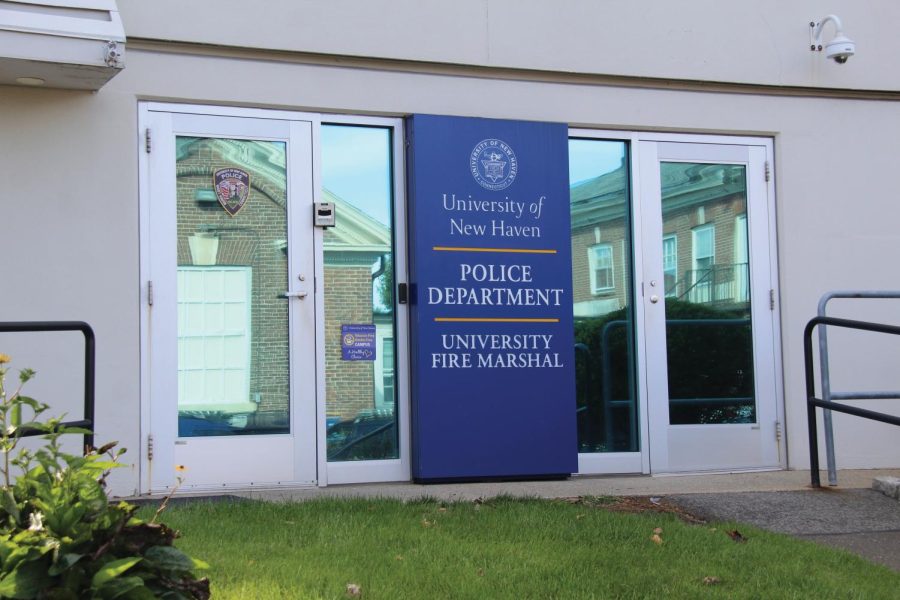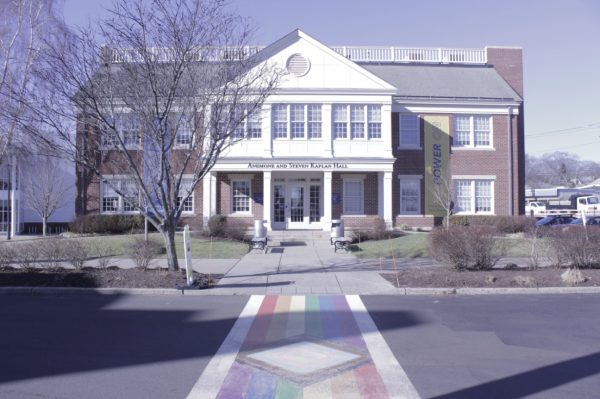UPD newly equipped with body cameras on campus
Photo courtesy of Charger Bulletin/Samuel Weinmann
The front of the University of New Haven Police Department, West Haven, Sept. 25, 2022.
As of July 1, 2022, all police officers working for the University of New Haven are required to wear body-worn cameras (BWCs) while on duty. This change went into effect throughout the state and across campus.
This change comes as part of new accountability guidelines for all sworn police officers across Connecticut. The law, titled “An Act Concerning Police Accountability” was passed in 2020 by the House of Representatives in the Connecticut General Assembly and later in the state Senate. It requires sworn police officers to wear BWCs during all public interactions.
The 64-page bill includes a number of substantial changes to policing in Connecticut beyond BWC implementation and usage. The General Assembly not only mandated the usage of BWCs by police officers but also required dashboard cameras to be installed in all police vehicles. The bill also included increased training in implicit bias and crowd management, the duty to intervene if a police officer witnesses excessive use of force and prohibiting departments from imposing quotas on officers for pedestrian citations.
On Aug. 31, the Dean of Students Office released an email on behalf of Dean of Students Ophelie Rowe-Allen and University Police Department (UPD) Chief Adam Brown detailing the changes. The email says–in part–“Body cameras record visual footage at all times. Officers are required to enable audio recording when interacting in a law enforcement capacity or when responding to a call for service.” They further elaborated, saying “UPD is committed to employing best practices for using body camera technology and in safeguarding the privacy of those we interact with. Above all, our paramount priority is protecting our campus, ensuring the safety of all students, faculty, staff, and visitors, and being accountable to the individuals we serve.”
The email went on to provide a statement of commitment to providing students with a “holistic approach to public safety and personnel development that enriches the mental health and intellectual wellness of our community.”
“I feel like I am more safe because I know, at least, I’m from New Jersey and by law there they have to let you know when they are recording and let you know if they’re recording you” freshman Grace McDermott said when asked about the change. “ I like the idea of them being recorded and having accountability for their actions, and I don’t really feel like my privacy is being invaded because they have to tell me, and if I don’t want to be recorded, I feel as though I can just leave the situation… I would like to have proof of what is actually happening versus word of mouth.”
Similarly, junior Tony Khanphouy feels safer on campus with BWCs. He said “For me, it’s okay. It promotes more safety.”
Sydney Robinson, a senior forensic psychology major, just recently found out about the UPD’s implementation of the devices, saying “I definitely feel like it’s needed given the area we live in, and just with everything going on. I definitely think that more university police departments need to be doing it.”
While this change is new for UNH, a number of other Connecticut colleges had previously adopted the usage of BWCs. According to the Quinnipiac Chronicle, Quinnipiac University’s Public Safety added BWCs to their tool kit in late Aug. 2017.
The University of Connecticut made the change even earlier, with a pilot program in the spring semester of 2016 with six officers on the Storrs campus and one at the UConn School of Law to test out wearing the devices. The university expected all 82 sworn police officers working for the school at the time to be wearing BWCs by the summer. UConn’s change came as a result of a law passed in 2015 that required several state agencies, including UConn, to have the equipment in use by July 1, 2016.
Similarly, in neighboring New Haven, Yale University Police officers have been wearing body cameras since 2016. The Yale University Police Department updates Order 427 on Body Worn Cameras annually in order to ensure the standards for BWC usage are up to date.












